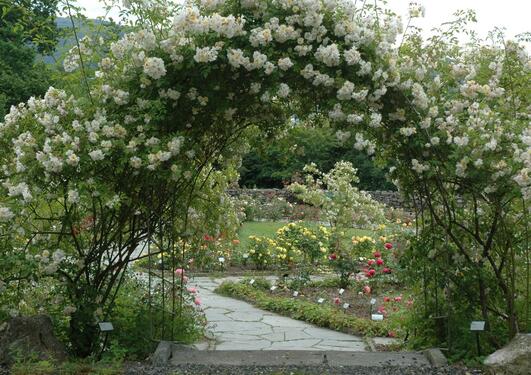The Wild Rose Walk
In the Wild Rose Walk, we present species roses: roses as found in their natural habitats

Main content
About 200 wild rose species are known to science. All are widespread in the Northern Hemisphere; most are in China. Their phylogenetic relationships are the subject of active research. We display a selection of wild rose species and their related garden forms that grow well in Western Norway, grouping them by similarity in external morphology.
Most species flower early (in May and June), but a few are later (the Carolinas). Some can repeat-flower (flower several times each summer). Wild roses develop wonderful rose hips in the autumn, formed by the flower base enclosing the fruits (nutlets). The can be juicy, taste sweet, and come in many colours and shapes.
1. CAROLINAE
Rosa virginiana, R. palustris, R. carolina etc.
Hypanthium ±depressed-globose with achenes on bottom only. Styles free, stigmas not excerted. Sepals decideous. Prickles ±straight, in pairs at petiole insertion, young shoots ±strongly bristly. Leaves with 7-9 leaflets. Flower pink or purple, scented, July-August. North America.
R. virginiana

2. GALLICANAE
Hypanthium ±globose or urn-shaped; achenes on bottom and walls. Styles free, excerted to ½ stamens’ length. Sepals lobed. Prickles slender, ±curved downwards, mixed with glandular bristles. Leaves with 3-5(-7) leaflets. Flowers often double, scented; petiole glandular-bristeled, lacking bracts. Flower white, pink, or purple. Europe to W Asia.
R. gallica

3. CANINAE
Rosa rubiginosa, R. mollis, R. canina etc.
Hypanthium ±urn-shaped; achenes on both bottom and walls. Styles free, excerted to ½ stamens’ length. Sepals lobed, reflexing and decidous or erect and persistent in fruit. Prickles robust, scattered, hooked or ±curved, sometimes mixed with bristels. 7(-9) leaflets. Flower pink or white, June; bracts broad. Europe to Central Asia.

4. PIMPINELLIFOLIAE
Rosa spinosissima, R. foetida, R. sericea etc.
Hypanthium ±globose to pyriform; achenes usually on both bottom and walls. Styles free, shorter than stamens. Sepals entire, erect in fruit, persistent. Often densely set with bristles, mixed with prickles. (5-)7-11(-17) small leaflets. Flower ±single, yellow, pink, or white, often scented, June; pedicel without bracts. Eurasia.
R. foetida


5a. CINNAMOMEAE, EURASIA - ARCTIC
Rosa glauca, R. pendulina, R. majalis etc.
Hypanthium ±depressed globose to urnshaped; achenes on bottom or on both bottom and walls. Styles free, not excerted. Sepals ±entire, erect in fruit, persistent. Prickles ±straight, robust, in pairs or scattered, often mixed with bristles. Upright, 5-11 leaflets. Flower pink or purple, June; bracts broad or convolute. N Eurasia, Arctic N America.


5b. CINNAMOMEAE, NORTH-AMERICA
Rosa pisocarpa, R. nutkana, etc.
Hypanthium ±depressed globose to urn-shaped; achenes on bottom or on both bottom and walls. Styles free, not excerted. Sepals ±entire, erect in fruit, persistent. Prickles ±straight, robust, in pairs or scattered, often mixed with bristles. Upright, 5-11 leaflets. Flower pink or purple, June; bracts broad or convolute. N America.

5c. CINNAMOMEAE, ASIA
Rosa moyesii, R. setipoda, etc.
Hypanthium ±depressed globose to elongate urn-shaped; achenes on bottom or on both bottom and walls. Styles free, not excerted. Sepals ±entire, erect in fruit, persistent. Prickles ±straight, robust, in pairs or scattered, often mixed with bristles. Upright, 5-11 leaflets. Flower pink, purple, June; bracts broad. E Asia.


6. SYNSTYLAEAE
Rosa multiflora, etc.
Hypanthium globose or elongated (small); achenes on bottom and walls. Styles united into excerted slender column, as long as stamens. Prickles scattered, robust, hooked. Climbing or trailing with 5-9 ±glossy leaflets. Flowers small, white or pink, in many-flowered corymbs, June-July; without bracts. Africa, Eurasia, N America.


7. CHINENSES
Rosa chinensis, Rosa x odorata etc.
Hypanthium globose or elongated; achenes on bottom and walls. Styles ±free, excerted more than ½ stamens’ length. Prickles scattered, hooked. Upright or climbing 3-5(-7) large leaflets. Flower strongly scented, often double, white, pink, or red, single or in corymbs, June. China, Vietnam, Thailand, Myanmar.
8. MICROPHYLLAE
Rosa roxburghii
Hypanthium cupular, persistently prickly; dry or ±fleshy, red-brown; achenes on projecting torus at base. Styles free, not excerted. Sepals erect in fruit, persistent. Prickles robust, in pairs below leaves. Diffuse shrub; 7-15(-19) leaflets. Bark grey-brown, flaking. Flower white, pink, purple, June-July. China, Japan.
